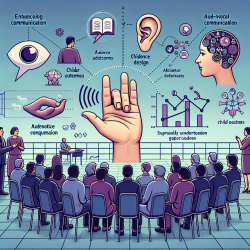As a practitioner in the field of special education, staying updated with the latest research and methods is crucial. One recent study, "Comparison du Test franco-quebecois de depistage des habiletes en lecture labiale aux epreuves d'evaluation des habiletes en lecture labiale utilisees en clinique au Quebec," provides valuable insights that can help you improve your lip-reading assessment skills. Let's delve into the key findings and see how you can implement them in your practice.
Key Findings of the Research
The study compared the Test franco-quebecois de depistage des habiletes en lecture labiale (TFQDHL) with other commonly used lip-reading assessment tools in Quebec rehabilitation clinics. The key findings are:
- The TFQDHL showed strong concurrent validity when compared to other tests.
- The classification of individuals' lip-reading abilities was consistent across different tests.
- The TFQDHL more specifically measures overall lip-reading ability.
Implementing the Findings in Your Practice
Here are some practical steps you can take to implement the findings of this research in your daily practice:
- Adopt the TFQDHL: Given its validated concurrent validity, consider using the TFQDHL as your primary assessment tool for evaluating lip-reading abilities. This can save time and provide reliable results.
- Streamline Your Assessment Process: The TFQDHL can be administered in about 15 minutes, significantly reducing the time required for comprehensive assessments. This efficiency can be beneficial in a clinical setting.
- Use Video Recordings: The study highlights the use of video recordings to ensure consistency and reliability in assessments. Implementing this can help in maintaining standardization across different evaluators and sessions.
- Focus on Overall Abilities: While analytical tests (e.g., visemes) are useful, the TFQDHL's focus on overall lip-reading abilities can provide a more comprehensive understanding of a client's capabilities.
Encouraging Further Research
While the TFQDHL is a robust tool, continuous research and validation are essential. As practitioners, you can contribute to the field by:
- Participating in Studies: Engage in ongoing research projects to help validate and refine assessment tools.
- Sharing Insights: Share your experiences and findings with the community through publications, conferences, and webinars.
- Collaborating with Researchers: Work closely with researchers to provide practical insights and feedback that can help improve existing tools and develop new ones.
By integrating these research findings into your practice and contributing to further research, you can enhance your skills and provide better support to your clients.
To read the original research paper, please follow this link: Comparison du Test franco-quebecois de depistage des habiletes en lecture labiale aux epreuves d'evaluation des habiletes en lecture labiale utilisees en clinique au Quebec










